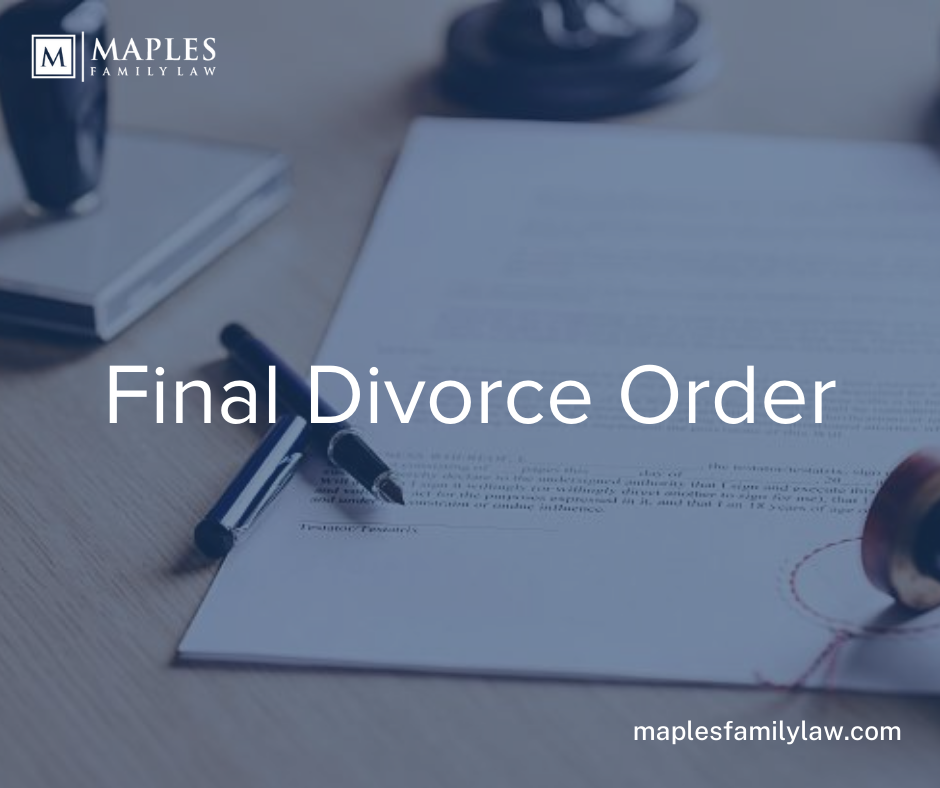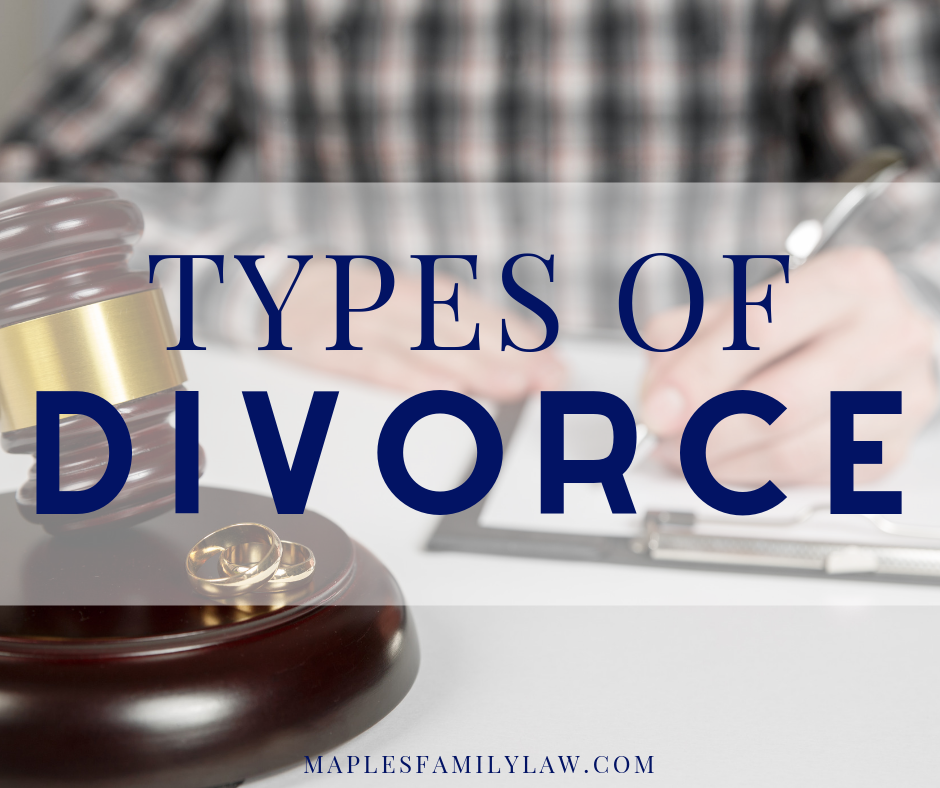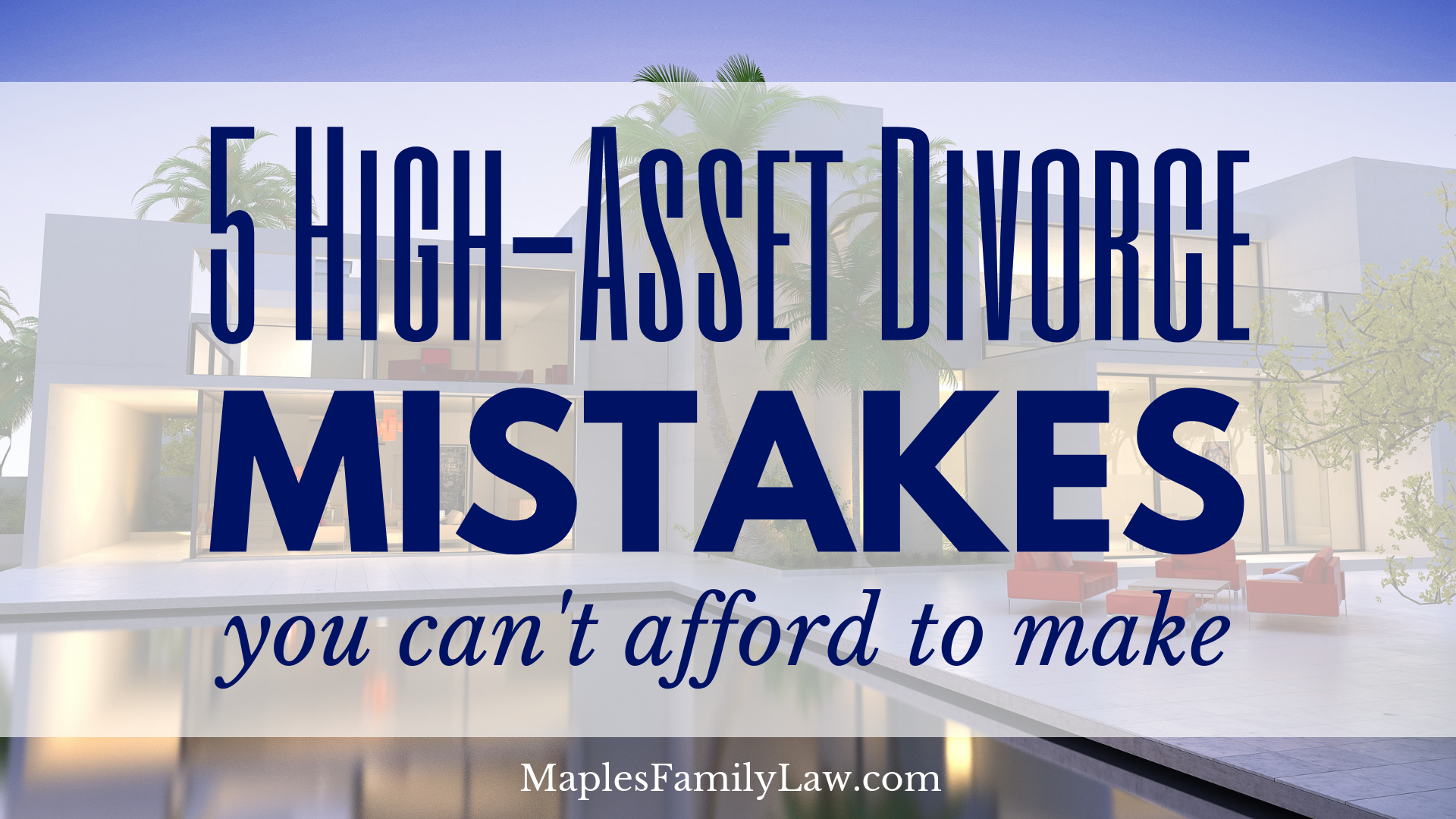 Divorce
Divorce
Final Divorce Order
Divorce involves a lot of really important decisions. Which means that—between dividing property, divvying up child custody, and figuring out mortgages (not to mention, family pets)—you’ll have a lot to keep track of, post-divorce.
Luckily, there’s one document that’ll have all the answers: your final divorce order.
A final divorce order is a legal document containing all of the decisions made during your divorce. Once approved by your judge, these terms are non-negotiable, and are fully enforceable under California law.
Here’s what you need to know about final divorce orders in California, and how Maples Family Law can help you get the best results possible.
What is a Final Divorce Order? 
In California, a final divorce order (or “divorce decree”) is a document that formally ends your marriage, and is something you’ll receive at the conclusion of your divorce proceedings.
Not to be confused with a “divorce certificate” (which merely acts as proof of your marital dissolution), a divorce decree is a judicial order that contains a summary of all the decisions made during your divorce, including all of the rights and responsibilities that will govern your post-divorce life.
Since every divorce is different, no two final orders will look exactly the same. However, some of the items that may be addressed in your final order could include:
- Separate and marital property
- Marital debt
- Child custody
- Visitation schedules
- Child support
- Alimony
Since a decree is essentially just a summary of your divorce negotiations, these terms shouldn’t surprise you. (If they do, then you should probably notify your attorney, immediately).
Exactly how much control you have in deciding these terms can actually vary significantly, however, depending on what type of divorce you choose.
Divorce Types and Divorce Orders
There are some things about a divorce order that are simply non-negotiable (such as child support minimums, which are set by California law, and can’t be messed with). But there are other areas that you and your spouse can exert control over—some more than others, depending on how well you’re able to communicate—and the type of divorce you choose.
Here’s a closer look.
Uncontested Divorce
In California, the fastest way to a final divorce order is through an uncontested divorce.
In this type of divorce, both spouses agree on all the major terms of their breakup, and, with nothing left to “fight” about, these couples can achieve a split by simply compiling their terms into a “marital settlement agreement.”
To be valid, this agreement must be signed by both parties, and should address your collective decisions about property, alimony, and children (if applicable). At your hearing, a judge will review this paperwork, and incorporate the terms into a final divorce order (so long as your arrangement is fair to both sides).
Although it’s the most direct path to a final divorce order—and offers the most control—this type of divorce generally only works for short marriages, those with very little property and no children.
Divorce Mediation 
The next best thing to an uncontested divorce route, is through divorce mediation.
Divorce mediation is an informal negotiation process that takes place outside of court, and is sometimes required if you have children. These meetings are supervised by a neutral, third party “mediator,” who acts as a referee, and helps couples reach a settlement without need of a judge.
If successful, the agreement you reach will be codified into a settlement agreement, and submitted to the court for review (much like in an uncontested divorce). In order to be binding, this document must be signed by both parties, and—for best results—should be overseen (and approved) by your trusted family law attorney.
A judge will review this agreement at your hearing, and—so long as it meets certain requirements (such as state child support minimums)—these terms will be incorporated into a final divorce order.
Another alternative dispute method you might try is collaborative divorce. However, if neither of these options work, you’ll have to proceed on to a divorce trial.
Divorce Litigation
Not only is litigation the longest route to a final divorce order, it’s also the least loved. This is because it’s—by far—the most expensive and time consuming of all divorces. In addition, this path offers couples the least amount of control over their final outcome, and is the most stressful and emotionally draining.
In a divorce trial, both sides gather evidence, which will be presented to the court in an attempt to sway a judge one way or the other. Each and every issue—from property to alimony—must be settled this way. And, at the end of this laborious process, you are presented with a final divorce order that consists of decisions you had very little say in making.
Hence, we suggest avoiding this route, if at all possible.
Enforcing a Final Divorce Order
You may not like them, however, once finalized, the terms of your final divorce order are non-negotiable. In California, divorce orders are fully enforceable, and failure to comply can result in some fairly hefty financial and/or legal consequences.
Some of these consequences could include wage garnishments, fines, liens, arrests, jail time, and even contempt of court (a serious criminal charge that will go on an offender’s permanent record).
Before you head back to court, however, try talking to your ex, first. Oftentimes, noncompliance is a result of a simple understanding, or else vague terms that need clarification, and can be resolved without judicial interference.
If there are legitimate reasons things aren’t working, talk to your attorney about modifying your order. As a general rule, contempt of court should always be a last-ditch resort.
Do You Need Help Finalizing Your California Divorce?
Divorce orders have a huge impact on post-divorce life. This document will govern important financial decisions, influence family dynamics, and affect you for years to come—even into retirement. Which is why it’s so important to make sure it’s drafted correctly, the first time around.
If you have more questions about final divorce orders in California, we want to hear from you. Call the Maples Family Law team at (209) 989-4425, or get in touch online, and let us help you negotiate the best terms possible.




















